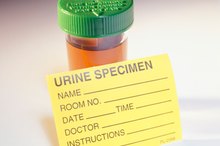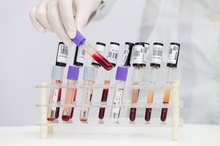Low Creatinine & BUN Counts
Both creatinine and BUN counts provide an overall picture of a person’s kidney function. Low levels are generally a good thing, while high levels can indicate varying degrees of kidney problems. A few lifestyle changes as well as medical management can help get your creatine and BUN counts under better control.
If you are experiencing serious medical symptoms, seek emergency treatment immediately.
What is Creatinine?
Creatinine is a normal metabolic by-product of muscle tissue function. Creatinine, a waste product, is always present to some degree in the body. Properly functioning kidneys filter creatinine out of the blood and into the urine for disposal. However, a person with kidney damage or disease may have higher levels of creatinine in their blood if the kidneys are not filtering as efficiently. A normal creatinine level, according to MayoClinic.com, falls somewhere between 0.6 to 1.2 mg per dL 2. Creatinine levels can vary, even for people with kidney failure, and this test alone is not always an adequate indicator of kidney function 2.
- Creatinine is a normal metabolic by-product of muscle tissue function.
- However, a person with kidney damage or disease may have higher levels of creatinine in their blood if the kidneys are not filtering as efficiently.
What is BUN?
Acceptable Creatinine Levels
Learn More
BUN stands for blood urea nitrogen 1. When proteins used in cells are broken down by the liver, the process leaves behind a waste product called urea. Like creatinine, urea ends up in the blood. The kidneys filter this urea out of the blood and into the urine. When your BUN is higher than normal, it could mean your kidneys are having trouble filtering waste. It may also indicate kidney disease or malfunction. A woman’s BUN generally falls between 6 and 21 mg per dL, while a man’s ranges may be slightly higher, between 8 and 24. A lower BUN is not always better: it could indicate other problems.
- BUN stands for blood urea nitrogen 1.
- When your BUN is higher than normal, it could mean your kidneys are having trouble filtering waste.
When BUN is Too Low
While low creatinine levels are generally a good thing, low BUN levels may not be. BUN that falls well under the normal range may indicate some degree of liver damage, and this can also be an early sign of malnutrition. Low BUN counts can also be caused by diet: MayoClinic.com reports that people on low-protein or high-carbohydrate diets may have lower numbers than the average person 2. If your BUN falls below the norm, your doctor may order additional tests to determine if there is an underlying medical condition.
- While low creatinine levels are generally a good thing, low BUN levels may not be.
- Low BUN counts can also be caused by diet: MayoClinic.com reports that people on low-protein or high-carbohydrate diets may have lower numbers than the average person 2.
Keeping Counts Low
Normal Levels of Urine Creatinine & Protein
Learn More
Maintaining normal levels of creatinine and BUN may involve taking medications or altering your diet. Drugs designed to slow the progression of kidney disease may be adequate in the early stages, though in the later stages you may require dialysis to maintain normal ranges. In addition, eating a renal diet can help. The National Kidney and Urologic Diseases Information Clearinghouse reports that you can maintain low creatinine and BUN counts by keeping your sodium, cholesterol, potassium and protein intake in check 4. This can not only keep you healthy but also slow the progression of kidney disease.
- Maintaining normal levels of creatinine and BUN may involve taking medications or altering your diet.
- Drugs designed to slow the progression of kidney disease may be adequate in the early stages, though in the later stages you may require dialysis to maintain normal ranges.
Related Articles
References
- MayoClinic.com: Creatinine Test
- National Kidney Foundation: How Your Kidneys Work
- Clinical Diagnosis By Laboratory Methods, Todd-Sanford, 15th edition, 1974.
- Note: All normal ranges are dependent on the laboratory and method used for testing
Writer Bio
Erica Jacques is an occupational therapist and freelance writer with more than 15 years of combined experience. Jacques has been published on Mybackpaininfo.com and various other websites, and in "Hope Digest." She earned an occupational therapy degree from Queen Margaret University in Edinburgh, Scotland, giving her a truly global view of health and wellness.









